
Ali Ahmad Said Esber, also known by the pen name Adonis or Adunis, is a Syrian poet, essayist and translator. He led a modernist revolution in the second half of the 20th century, "exerting a seismic influence" on Arabic poetry comparable to T.S. Eliot's in the anglophone world.

Bashar al-Assad is a Syrian politician who is the current and 19th president of Syria since 17 July 2000. In addition, he is the commander-in-chief of the Syrian Armed Forces and the secretary-general of the Central Command of the Arab Socialist Ba'ath Party, which nominally espouses a neo-Ba'athist ideology. His father and predecessor was General Hafiz al-Assad, whose presidency in 1971–2000 marked the transfiguration of Syria from a republican state into a de facto dynastic dictatorship, tightly controlled by an Alawite-dominated elite composed of the armed forces and the Mukhabarat, who are loyal to the al-Assad family.

The situation for human rights in Syria is considered one of the worst in the world and has been globally condemned by international organizations like the United Nations, Human rights Watch, Amnesty International, and the European Union. Civil liberties, political rights, freedom of speech and assembly are virtually non-existent under the Ba'athist government of Bashar al-Assad; which is regarded as "one of the world's most repressive regimes". The 50th edition of Freedom in the World, the annual report published by Freedom House since 1973, designates Syria as "Worst of the Worst" among the "Not Free" countries. The report lists Syria as one of the two countries to get the lowest possible score (1/100).
Mai Ghoussoub was a Lebanese writer, artist, publisher and human rights activist. She was the co-founder in London of the Saqi bookshop and publishing house.
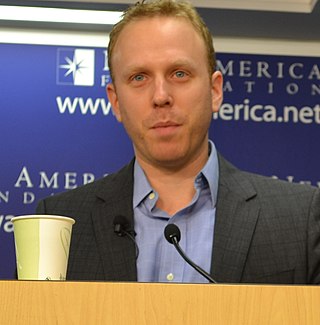
Max Blumenthal is an American author and blogger. He was a writer for The Nation, AlterNet, The Daily Beast, Al Akhbar, Mondoweiss, and Media Matters for America, and has contributed to Al Jazeera English, The New York Times and the Los Angeles Times. He has been a writing fellow of the Nation Institute. He is a regular contributor to Russian state-owned Sputnik and RT.

The al-Assad family, also known as the Assad dynasty, is a Syrian political family that has ruled Syria since Hafiz al-Assad became president of Syria in 1971 under the Ba'ath Party. After his death, in June 2000, he was succeeded by his son Bashar al-Assad.
The following is a timeline of the Syrian Civil War from May to August 2011, including the escalation of violence in many Syrian cities.

Imad Muhammad Dib Khamis is a Syrian politician who served as the 67th prime minister of Syria from 2016 to 2020 under president Bashar al-Assad. Previously, he was minister of electricity from 2011 to 2016.
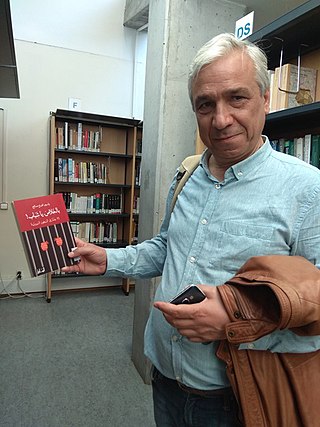
Yassin al-Haj Saleh is a Syrian writer and political dissident. He writes on political, social and cultural subjects relating to Syria and the Arab world.

Since the start of the Syrian Civil War, all sides have used social media to try to discredit their opponents by using negative terms such as 'Syrian regime' for the government, 'armed gangs/terrorists' for the rebels, 'Syrian government/US State Department propaganda', 'biased', 'US/Western/foreign involvement'. According to the Stockholm International Peace Research Institute, given the complexity of the Syrian conflict, media bias in reporting remains a key challenge, plaguing the collection of useful data and misinforming researchers and policymakers regarding the actual events taking place.
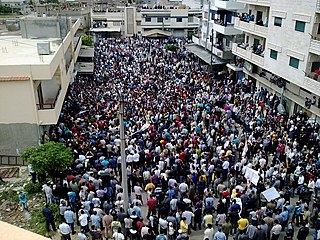
On 7 May 2011, during the Syrian revolution, the Syrian military launched an operation in the Syrian city of Baniyas. The government said it was targeting terrorist groups, while the Syrian opposition called it a crackdown against pro-democracy protesters. The operation lasted until 14 May 2011.
Ibrahim Qashoush was a prominent Syrian protest singer during the civil uprising phase of the Syrian Civil War. Posthumously, the international media ascribed him the role of a leading author and singer of protest songs in his home city. He became a symbolic figure of the civil war as a civilian presumably murdered as revenge for his musical performances. Later media reports, however, call this account into question.
Protests began in Syria as early as 26 January 2011, and erupted on 15 March 2011 with a "Day of Rage" protest generally considered to mark the start of a nationwide uprising. The Syrian government's reaction to the protests became violent on 16 March, and deadly on 18 March, when four unarmed protesters were killed in Daraa.

Samar Yazbek is a Syrian writer and journalist. She studied Arabic literature at Tishreen University (Latakia). She has written in a wide variety of genres including novels, short stories, film scripts, television dramas, film and TV criticism, and literary narratives. Several of her works have been translated from the Arabic original into other languages.
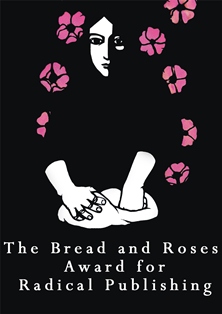
The Bread and Roses Award for Radical Publishing is a British literary award presented for the best radical book published each year, with radical book defined as one that is "informed by socialist, anarchist, environmental, feminist and anti-racist concerns" – in other words, ideologically left books. The award believes itself to be the UK's only left-wing only book prize. Books must be written, or largely written by authors or editors normally living in the UK, or international books available for purchase in the UK. Winning authors receive £1,000. The Bread and Roses Award is sponsored by the Alliance of Radical Booksellers and has no corporate sponsorship.

The Democratic Union Party is a Kurdish left-wing political party established on 20 September 2003 in northern Syria. It is a founding member of the National Coordination Body for Democratic Change. It is the leading political party among Syrian Kurds. The PYD was established as a Syrian branch of the Kurdistan Workers Party (PKK) in 2003, and both organizations are still closely affiliated through the Kurdistan Communities Union (KCK).

The Battle of Aleppo was a major military confrontation in Aleppo, the largest city in Syria, between the Syrian opposition against the Syrian government, supported by Hezbollah, Shia militias and Russia, and against the Kurdish-majority People's Protection Units (YPG). The battle began on 19 July 2012 and was part of the ongoing Syrian Civil War. A stalemate that had been in place for four years finally ended in July 2016, when Syrian government troops closed the rebels' last supply line into Aleppo with the support of Russian airstrikes. In response, rebel forces launched unsuccessful counteroffensives in September and October that failed to break the siege; in November, government forces embarked on a decisive campaign that resulted in the recapture of all of Aleppo by December 2016. The Syrian government victory was widely seen as a turning point in Syria's civil war.

Mazen Darwish is a Syrian lawyer and free speech advocate. He is the president of the Syrian Center for Media and Freedom of Expression. News organizations, including Reuters and the Associated Press, have described him as one of Syria's most prominent activists. He was imprisoned in Syria from 2012 until his release in August 2015.
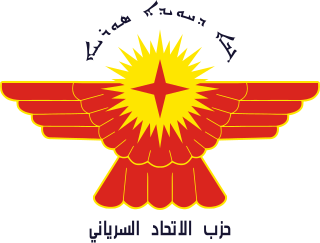
Syriac Union Party in Syria is a secular Assyrian/Syriac political party in Syria that represents the interests of Assyrians in Syria and is committed to the Dawronoye modernization ideology. Established on 1 October 2005, since the start of the Syrian Civil War it has positioned itself on the side of secular, democratic, socialist and federalist Kurdish forces in Rojava, skeptical of both the Ba'athist Syrian government of Bashar al-Assad and the National Coalition for Syrian Revolutionary and Opposition Forces.

Shaheen Merali is a Tanzanian writer, curator, critic, and artist. Merali began his artistic practice in the 1980s committing to social, political and personal narratives. As his practice evolved, he focused on functions of a curator, lecturer and critic and has now moved into the sphere of writing. Previously he was a key lecturer at Central Saint Martins School of Art (1995-2003), a visiting lecturer and researcher at the University of Westminster (1997-2003) and the Head of the Department of Exhibition, Film and New Media at the Haus der Kulturen der Welt, Berlin (2003-2008). A regular speaker on ideas of contemporary exhibition making internationally, in 2018 he was the keynote speaker at the International Art Gallery of the Aga Khan Diamond Jubilee Arts Festival, Lisbon.
















